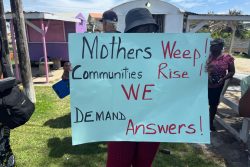 When I was a young child, I did not necessarily consider myself Black. Looking back, I recognize how odd of a thing it was because my immediate family members were all clearly African descendants. In my young mind though, I could not make sense of my differences when compared to the majority of the family I grew up with. I was lighter and had different features; so clearly, I had to be “different” from them, right? With race not being something that was really discussed, I relied on knowledge I gained from studying history and popular culture to get an idea of who I was. I tried to find my face in books and screens but could not find myself represented in the images that stared back at me. I then began to take cues about my identity from the way people responded to me. So for quite some time and at varying points, I identified as being either Portuguese or Indigenous. Even well into my teenage years, when I had a lot more knowledge surrounding race and culture, I would still shy away from identifying as Black and would find comfort in my “mixed” makeup. Whenever someone asked me what I was mixed with – because they always ask – I would begin tracing lines to families that were far removed from me. It was quite an odd thing.
When I was a young child, I did not necessarily consider myself Black. Looking back, I recognize how odd of a thing it was because my immediate family members were all clearly African descendants. In my young mind though, I could not make sense of my differences when compared to the majority of the family I grew up with. I was lighter and had different features; so clearly, I had to be “different” from them, right? With race not being something that was really discussed, I relied on knowledge I gained from studying history and popular culture to get an idea of who I was. I tried to find my face in books and screens but could not find myself represented in the images that stared back at me. I then began to take cues about my identity from the way people responded to me. So for quite some time and at varying points, I identified as being either Portuguese or Indigenous. Even well into my teenage years, when I had a lot more knowledge surrounding race and culture, I would still shy away from identifying as Black and would find comfort in my “mixed” makeup. Whenever someone asked me what I was mixed with – because they always ask – I would begin tracing lines to families that were far removed from me. It was quite an odd thing.
Identity can be complex, but all that I am today, I owe it to Black women who quite simply, did not have time for my nonsense. They told me things as they were and pointed me in the right directions to figure out the rest. I have realized that the confusion or diversion from Blackness is something that is fairly common for persons who have mixed ancestries; particularly if it is that they are mixed with more than two races. There is confusion as to what really one is and what to identify as and within this confusion lays a whole host of ethnic and socioeconomic biases and hang-ups. As children, we don’t understand the particulars of these things but we do understand – at least intrinsically – the social status that is seen in not being Black. In the social scale of who is deserving of education, money and power, Black people have historically been on the bottom rungs, and while many are wont to deny it, this is something that remains today.
So it is understandable, albeit sad, the way in which many of us grow up distancing ourselves from Blackness because we are taught that being Black is something that is bad. We are taught that the further removed from Blackness we are, the more worth we have. We should reject the comfort that is found in not identifying as Black. This is not to say that one must reject other aspects of their identity.
The reality is that the experiences of a person of mixed race tends to be different from persons who are mono-racial or who are unambiguously Black. Those who are mixed should however be aware of the privileges they have, no matter how relative, and utilize those privileges to centre the voices and issues of darker skinned Black persons.
We have a long way to go in creating an environment where anti-Blackness is not so deeply entrenched in the psyches of our people and thus the social, professional and political systems within which we exist. As of late, with burgeoning movements around the world centring the humanity and importance of Black lives and the academic and entertainment industry propelling Black voices, images and ideas, there has been an increasing shift in the way Blackness is being viewed. More Afro-descendants now readily identify with Blackness. While this is good, the flip side of this is that there is a growing tendency for non-Black people to fetishize or assume Blackness because they see our racial and cultural identities as being something that is trendy and fun, or something that they can earn from. Some popular and oft sited examples of this can be seen in personalities such as the Kardashian/Jenner clan and the Rachel Dolezals’ of the world. Right here at home though, non-Black persons exploit and weaponize Blackness whenever it suits them and then discard it when it does not.
Despite the uncontestable existence of it, Guyana largely is yet to come to terms with anti-Blackness within our homes, communities, places of business and power. In refusing to be honest about the way Black people continue to be viewed and thus targeted and exploited, a dangerous dynamic is being maintained. Hopefully, there soon will come a time where we are able to not only have honest conversations about anti-Blackness, but move past these conversations to implement actionable policies and systemic changes that can contribute to a more equitable and inclusive society.









